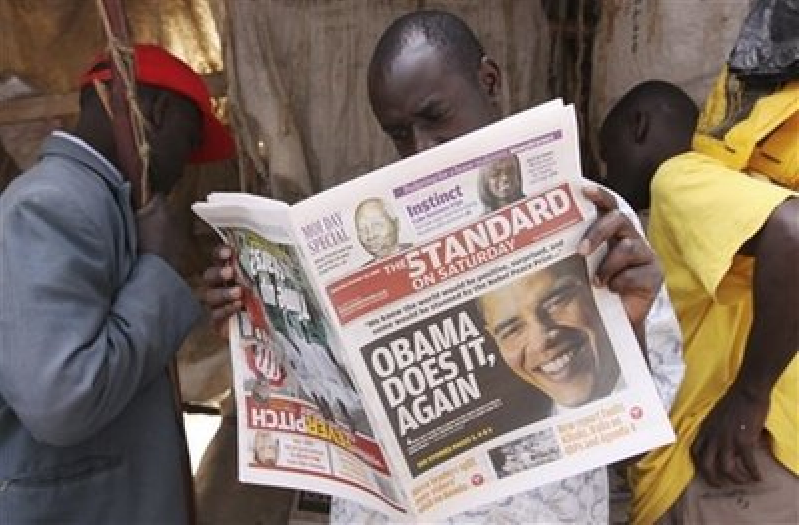
News of President Obama’s Nobel Peace Prize win Friday generated a flurry of reactions across the nation and the world – from high praise and approval to criticism and disbelief.
Though widely varying, consistent throughout all reactions was surprise given that Obama was in office for less than two weeks before the Feb. 1 deadline for this year’s nominations and that Obama, if anything, has only got the ball rolling but not yet bowled his game.
“Nobel Prize awarded by faith alone on the basis of imputed righteousness? Guess the Scandinavians are recovering their Lutheran roots,” commented Dr. Russell D. Moore, dean of the School of Theology and senior vice-president for Academic Administration at The Southern Baptist Theological Seminary.
“It's like awarding me a Pulitzer for a book I'm thinking about writing,” chimed popular Christian blogger Joanne Brokaw. “Everyone thinks it's a great book idea; all I need to do is actually write it. In which case it may or may not even be readable, let alone a success.”
According to the Norwegian Nobel Committee, however, Obama has made substantial contributions toward peace so far and has furthermore become the “world’s leading spokesman” for “precisely” the attitudes and the international policy that the committee has sought to stimulate in the 108 years that the international award has been awarded.
“Obama has as President created a new climate in international politics. Multilateral diplomacy has regained a central position, with emphasis on the role that the United Nations and other international institutions can play,” the five-member committee stated in its announcement Friday.
“The vision of a world free from nuclear arms has powerfully stimulated disarmament and arms control negotiations. Thanks to Obama's initiative, the USA is now playing a more constructive role in meeting the great climatic challenges the world is confronting. Democracy and human rights are to be strengthened,” it added.
Some of the top Christian leaders in the nation and in the world also defended the awarding of the Nobel Prize to Obama.
“I first heard the call for a world free of nuclear weapons from President Ronald Reagan when he addressed the National Association of Evangelicals over twenty-five years ago. The Nobel prize for President Obama acknowledges and perpetuates the Reagan vision,” commented NAE President Leith Anderson.
The Rev. Dr Ishmael Noko, general secretary of the Lutheran World Federation, meanwhile, noted how Obama “has helped generate a tidal wave of hope around the world.”
“He has acknowledged that the fundamental aspirations of nations and peoples are shared aspirations, and has affirmed the importance of international cooperation in achieving them,” the Lutheran leader expressed in a statement Friday.
“He has begun to restore broken relationships, including across faith boundaries. These are very significant contributions to progress towards peace and security, and important foundations for facing the global crises we must face,” Noko added.
In his own comments, a “surprised and deeply humbled” Obama acknowledged that he does not feel that he deserves to be “in the company of so many of the transformative figures who've been honored by this prize – men and women who've inspired me and inspired the entire world through their courageous pursuit of peace.”
“But I also know that this prize reflects the kind of world that those men and women, and all Americans, want to build – a world that gives life to the promise of our founding documents,” he added.
The president noted that the Nobel Peace Prize, throughout history, has not just been used to honor specific achievement but also as a means to give momentum to a set of causes.
“And that is why I will accept this award as a call to action – a call for all nations to confront the common challenges of the 21st century,” he stated.
Since 1901, the Nobel Prize has been awarded for achievements in physics, chemistry, physiology or medicine, literature and for peace.
In its statement Friday, the Nobel Committee said it has attached “special importance” to Obama's vision of and work for a world without nuclear weapons.
“Only very rarely has a person to the same extent as Obama captured the world's attention and given its people hope for a better future,” the committee added.
Last year’s winner, Martti Ahtisaari, the former president of Finland, was awarded for his efforts to resolve international conflicts on several continents for over more than three decades.
The year before that, the committee awarded the Peace Prize to the Intergovernmental Panel on Climate Change (IPCC) and former U.S. vice-president Al Gore for their efforts to build up and disseminate greater knowledge about climate change, and to lay the foundations for the measures that are needed to counteract such change.
Other past winners include Mother Teresa, Martin Luther King Jr., former President Jimmy Carter, and former President of South Africa Nelson Mandela.
For the 2009 award, the committee whittled down a record pool of 205 nominations. The committee does not release the names of any candidates and keeps records sealed for 50 years.







